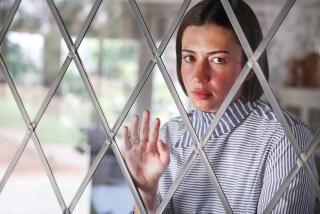Opinion: The blame game surrounding the nude photos hacked from iCloud

- Share via
After hackers released nude photos of dozens of female celebrities, the online commentariat exploded in a frenzy of finger-pointing — often at the victims. Those critics have, in turn, come under attack from those who believe that Jennifer Lawrence has just as much of a right to take nude selfies as a woman who’s never even been nominated for an Academy Award.
The debate is fraught with 20/20 hindsight and posturing about what is and isn’t moral. The simple fact here is that one or more hackers got into private accounts, most likely in the cloud (in particular, Apple’s iCloud service), and took copies of something that didn’t belong to them in the hope of a payday. Greedy hackers are bad — what a news flash.
Yet there are lessons to be learned, including:
1) Celebrities are targets because the rest of the world takes a perverse interest in them. If hackers grabbed nude selfies taken of random people across the country, how many of us would race to view those images? How many sites would write about them or link to them? And while some celebrities try to harness this interest to promote their careers (such as Rihanna, whose Twitter feed seems racy enough to obviate the need for hacking her private accounts), they are just playing the hand someone else dealt.
So don’t blame them when someone invades their privacy, which is what happened here.
2) Anyone who clicks on a celebrity photo — nude or clothed, stolen or authorized — helps sustain the demand for more information about them. The folks who tut-tut about actresses needing to resist the urge to memorialize their natural selves would be better off wagging their fingers at the millions of consumers who buy People magazine or visit TMZ.com. If the hacked celebrity photos had appeared only at 4chan, the site where they first landed over the weekend, the incident might have been forgotten by now.
The hack became public shortly after the California Legislature passed a bill (AB 1327) to give people more protection against cameras mounted on drones that fly over private spaces. In a civilized society, why do we have to worry about photographers using drones to peek behind fences or peer into bedroom windows? Not because the photographers who use them are terrible human beings (although they might be) but because society provides a market for their work. Shame on us.
3) We live in an age of well-documented lives, and we can’t fault people for trying to preserve those records. The evolution of the cellphone from luxury business item to indispensable personal accessory led to a number of unexpected developments, one of them being that just about everybody always has a camera at the ready. Meanwhile, communications has become more of a visual medium, thanks to technologies such as Instagram and FaceTime.
Hence the trend toward memorializing and, occasionally, sharing such personal moments as examining oneself in a mirror. Which leads to the question ...
4) Why are we criticizing people who backed up their photos online? Isn’t that what the tech industry has been browbeating us to do since well before Y2K? And considering how often people upgrade or break their phones, isn’t it foolish not to make copies of your phone’s contents regularly?
Oh, but you say, it’s stupid to put a nude selfie in the cloud. So tell me, do you know how to change the automated feed to iCloud, Google Photos or similar backup service so that it excludes potentially embarrassing material? It can’t, as far as I can tell — everything gets backed up automatically, or nothing does. The alternative is to upload items manually, which doesn’t make much sense for anyone who takes more than a few images a week.
More important, these backup services upload copies to supposedly private online lockers. So users expect them to be a better destination for sensitive material than, say, Flickr or Instagram, which are designed to communicate images as opposed to just preserving data.
Because they store so much information, cloud-based sites are more likely to attract hackers than a random laptop or hard drive. But let’s face it, anything that’s connected to a network is vulnerable. If you’re going to assume that everything will be hacked at some point, as some wizened Internet users advise, then you’ll have to avoid saving anything that’s sensitive — including pictures of your children and young relatives. It’s impossible to live that way.
5) All the same, it’s important to edit your stored photos. And sadly, cloud services such as iCloud that synchronize content across multiple devices can make this harder than you might think. When you delete an unwanted image from your phone, do you remember to delete it from every device and site your phone syncs to? At least one of the women whose photos were hacked said she thought she had erased the images in question. And she probably had, but just on her phone.
6) The very nature of celebrity denies members of that group the one thing that really does protect privacy: the ability to get lost in the crowd. Should all the photos on iCloud suddenly become available to the public, the vast majority of its users would still have nothing to worry about — there are just too many pieces of data to sift through.
We don’t know for sure how hackers got the nude photos from iCloud, although Apple’s security measures have taken some flak. Apple on Tuesday said its systems weren’t at fault, but rather a “targeted attack on user names, passwords and security questions” — as if those features weren’t part of Apple’s security design.
Regardless, if there’s one thing we can blame Lawrence and other victims for here, it’s for not picking user names that aren’t intuitive and passwords they couldn’t remember. There’s an app for that, people! In fact, there are a bunch of them. And you know what? They’re all based in the cloud.
Follow Healey’s intermittent Twitter feed: @jcahealey
More to Read
Sign up for Essential California
The most important California stories and recommendations in your inbox every morning.
You may occasionally receive promotional content from the Los Angeles Times.














